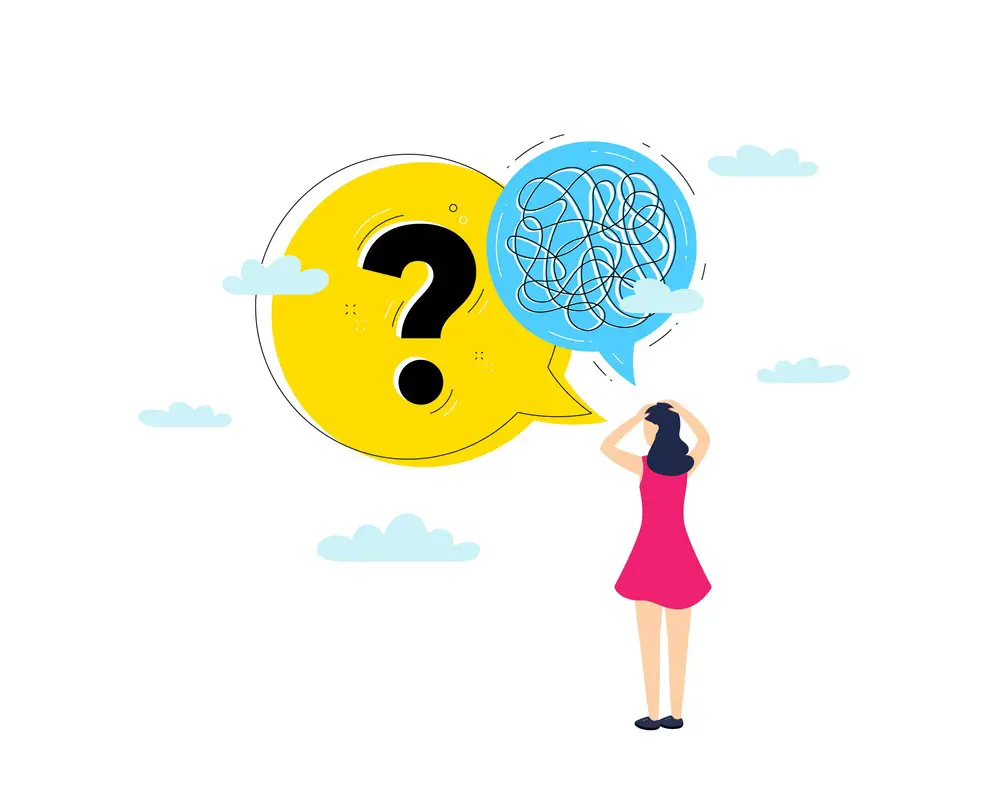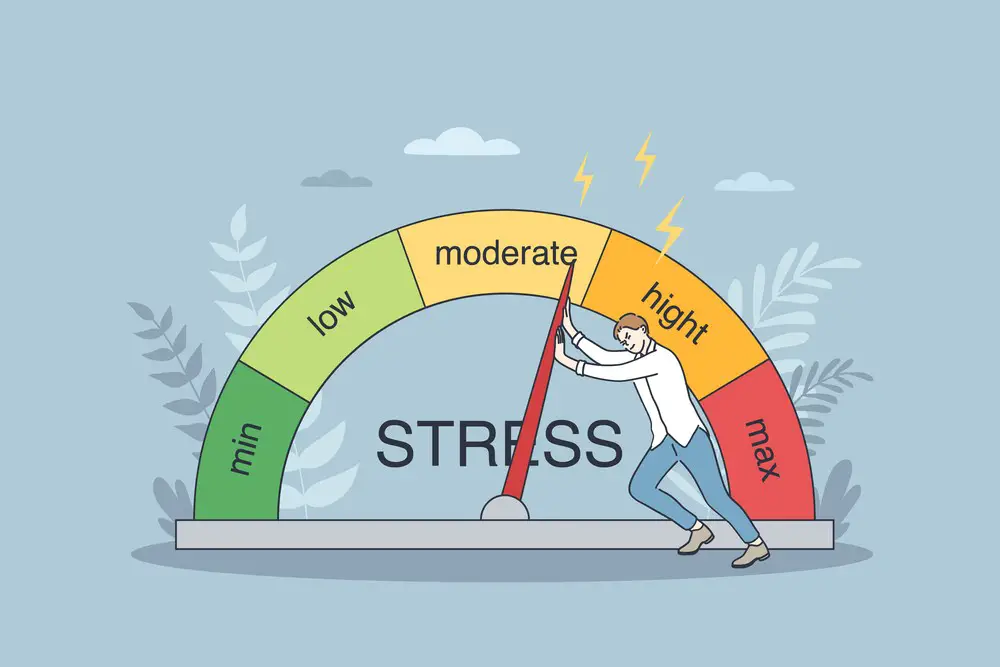As a BetterHelp affiliate, we receive compensation from BetterHelp if you purchase products or services through the links provided
Vertigo, often described as a whirling sensation or dizziness, can be disconcerting for those who experience it. While vertigo is linked to multiple medical causes, the potential relationship between stress and this disorienting condition remains an area of interest. While it’s not directly proven that stress is a causative factor for vertigo, evidence suggests that stress might influence the vestibular system — the section of the inner ear central to our sense of balance and spatial orientation. To effectively tackle and perhaps even preempt vertigo, it’s crucial to comprehend how stress might play a role.
Understanding the ripple effects of stress on our physiology is critical. When faced with stressors, our bodies release hormones like cortisol and adrenaline. These hormones initiate reactions including accelerated heart rate, heightened respiration, and muscle stiffness. Simultaneously, prolonged stress can weaken our immune defenses, elevating the risk of infections and related health complications. Given these interconnected responses, the theory that stress could indirectly set the stage for conditions inducing vertigo becomes increasingly credible.
Key Takeaways
- Stress may indirectly contribute to vertigo by affecting the vestibular system responsible for balance and coordination.
- Recognizing the physical symptoms of stress and its impact on the immune system can help understand the link between stress and vertigo.
- Exploring the relationship between stress and vertigo is essential for finding effective ways to manage and potentially prevent vertigo.
 Understanding Vertigo
Understanding Vertigo
How the Vestibular System Controls Balance
The vestibular system, located in your inner ear, is crucial in maintaining your sense of balance and coordination. This delicate system contains structures like the semicircular canals and the otolith organs, which work together to detect changes in your head position and motion. Signals from these structures are sent to your brain through the vestibular nerve, helping you maintain balance and navigate your environment effectively.
Symptoms of Vertigo
When the vestibular system is disrupted, it can result in a condition called vertigo. Vertigo is a sensation of spinning or motion, making you feel dizzy and off-balance. It can occur even when you are standing still and is often accompanied by other symptoms, which may include:
- Nausea
- Vomiting
- Sweating
- Difficulty walking
- Tinnitus (ringing in the ears)
- Hearing loss
- Visual disturbances
Although stress doesn’t directly cause vertigo, it can contribute to the dysfunction of your vestibular system. Knowing the potential effects on your balance and coordination when dealing with high stress or anxiety levels is essential. By managing stress and addressing any underlying issues, you can help maintain the proper functioning of your vestibular system and prevent vertigo episodes.
Stress and its Effects on the Body
Stress Hormones and Their Impact
When you experience stress, your body releases stress hormones like cortisol and adrenaline. These hormones prepare your body to respond to stressful situations by increasing your heart rate, constricting blood vessels, and raising blood sugar levels. However, ongoing exposure to stress hormones can negatively affect your health. For example, elevated cortisol levels can affect your brain, heart, and other vital organs, potentially increasing the risk of anxiety disorders, heart issues, and other health complications.
Physical Symptoms of Stress
Stress can manifest in physical symptoms that may impact your health and well-being. Some common physical symptoms of stress include:
- Chest pain and rapid heartbeat: In response to stress, your heart rate may increase, and you may experience tightness or pain in your chest.
- Muscle tension and weakness: Stress can cause your muscles to tense up, resulting in aches, pain, and fatigue.
- Sweating: Your body may react to stress by producing excessive sweat, especially in situations that provoke anxiety or panic attacks.
- Headaches and migraines: Tension or stress-induced headaches can become more frequent or severe during periods of high stress.
- Digestive issues: Stress can impact your gut, leading to symptoms like nausea, diarrhea, or constipation.
By understanding how stress affects your body, you can better identify the signs of distress and take steps toward managing your stress levels. Finding healthy coping mechanisms, such as exercise, meditation, or seeking professional help, can significantly improve your mental and physical health in the face of life’s stressors. Remember, caring for your body and mind is essential to maintaining a balanced and happy life.
 Exploring the Link Between Stress and Vertigo
Exploring the Link Between Stress and Vertigo
Research Studies on Vertigo and Stress
Although stress may not directly cause vertigo, research suggests it could impact your vestibular system, the part of your inner ear responsible for balance and coordination. When your vestibular system is disrupted, it can trigger vertigo. Stress may lead to neurological changes that affect the functioning of this system.
Scientists are still studying the connection between stress and vertigo, but it’s essential to recognize its potential role in your symptoms. For example, stress and anxiety could aggravate conditions that might cause vertigo, like migraines or vestibular migraines. A 2014 study found that individuals with vertigo experienced a higher prevalence of anxiety and depressive disorders.
Stress as a Trigger of Vertigo
If you’re prone to experiencing vertigo, stress could act as a trigger. One of the reasons stress might exacerbate vertigo is the relationship between stress and panic attacks. Panic attacks cause dizziness and lightheadedness, which can potentially develop into vertigo.
Also, stress might lead to other physiological changes in your body that can trigger vertigo. For instance, when you’re stressed, you might experience changes in blood pressure, muscle tension, and an increased heart rate, all of which can contribute to the onset of vertigo.
To summarize, it’s essential to be aware of stress’s potential impact on your vertigo symptoms. While more research is needed to understand the connection, consider practicing stress management techniques, such as relaxation exercises, mindfulness, and adequate sleep, to keep your vertigo in check.
Common Conditions that Cause Vertigo
Benign Paroxysmal Positional Vertigo (BPPV)
Benign paroxysmal positional vertigo (BPPV) is one of the most common causes of vertigo. This condition occurs when calcium crystals within your inner ear displace and cause trouble in the vestibular system, essential for maintaining balance.
Notably, BPPV is more likely to affect older people as the risk of developing this condition increases. Furthermore, it is also found that individuals who suffer from anxiety disorders are 2.17 times more likely to develop BPPV.
Some potential causes of BPPV include head injuries, inner ear disturbances, and certain viral infections such as vestibular neuritis. Other conditions involving your ear, like Ménière’s disease and labyrinthitis, may also lead to vertigo.
In addition to these medical causes, situational factors such as motion sickness can also contribute to the sensation of vertigo. Understanding the various causes and conditions that lead to vertigo allows you to recognize the symptoms and seek appropriate treatment when necessary.
Remember to consult a healthcare professional if you experience lasting or severe vertigo. They can provide a more accurate diagnosis and recommend the appropriate treatment options.
Diagnosis and Treatment of Vertigo
Diagnosing Vertigo
When you experience symptoms like dizziness, nausea, lightheadedness, or vomiting, it could indicate vertigo. To diagnose vertigo, your doctor will perform a thorough examination that involves observing eye movements, testing balance, and assessing your senses. One common test used for diagnosing vertigo is the Dix-Hallpike test, which helps identify Benign Paroxysmal Positional Vertigo (BPPV) by provoking nystagmus (involuntary eye movements).
Other potential causes of vertigo besides BPPV include issues with the inner ear, nerves, or a stroke. Sometimes, headaches or even stress can contribute to vertigo symptoms. Your doctor will consider these factors along with your medical history to arrive at an accurate diagnosis.
Vertigo Treatment Options
Once your doctor diagnoses the cause of your vertigo, they will recommend a suitable treatment plan. Here are some common treatment options:
- Medications: Depending on the cause, your doctor might prescribe medications to help relieve symptoms like dizziness, nausea, or vomiting. These can include antiemetics, antihistamines, or benzodiazepines.
- Repositioning maneuvers: If you suffer from BPPV, your doctor might perform repositioning maneuvers, such as the Epley maneuver or Semont maneuver, to correct the positional imbalance in your inner ear.
- Balance exercises: You might be referred to a physical therapist for vestibular rehabilitation exercises, which can help improve your balance, coordination, and stability.
- Lifestyle adjustments: Sometimes, simple lifestyle adjustments such as stress management, staying hydrated, and avoiding triggers like caffeine or alcohol can help reduce vertigo episodes.
Remember to consult your doctor for a proper diagnosis and personalized treatment plan if you suspect you have vertigo. While some cases of vertigo may improve within a few weeks, professional guidance is crucial to ensure your well-being and long-term health.
Managing Stress to Prevent Vertigo
Importance of Exercise
Regular exercise can help manage stress and, thus, potentially decrease the likelihood of experiencing vertigo due to stress. Engaging in physical activities releases feel-good chemicals called endorphins, improving mood and reducing stress. Aim for at least 30 minutes of moderate-intensity exercise most days of the week. This can include activities like walking, swimming, or cycling.
Besides the physical benefits, exercise can provide mental benefits as well. It can help clear your mind, allow for better focus, and improve sleep quality. Remember to incorporate relaxation exercises like deep breathing, yoga, or tai chi to reduce stress further.
 Psychological Approaches
Psychological Approaches
In addition to exercise, psychological approaches can be effective in managing stress and preventing vertigo:
1. Meditation: Practicing meditation can help you become more aware of the present moment, allowing your mind to focus on your breath and relax. Regular meditation can lower your stress levels and reduce your risk of stress-induced vertigo.
2. Psychotherapy: A professional therapist can help you explore the underlying causes of stress and provide guidance on coping strategies. Cognitive-behavioral therapy (CBT) is a type of psychotherapy that focuses on identifying and challenging negative thought patterns and beliefs. This approach can be particularly helpful for addressing stress-related vertigo.
3. Sleep: Prioritizing sleep is essential for stress management. Aim for at least 7-8 hours of quality sleep per night. Establish a regular sleep schedule, create a relaxing bedtime routine, and make your sleep environment as comfortable as possible.
Remember, it’s essential to strike a balance between physical and psychological approaches when it comes to managing stress. Combining exercise with meditation, psychotherapy, and proper sleep can help you maintain a healthy mindset, reduce stress, and ultimately prevent stress-related vertigo.
Frequently Asked Questions

How does stress affect vertigo?
Stress can exacerbate vertigo symptoms due to its impact on the body’s balance and coordination systems. When stressed, your body releases stress hormones that can impair brain function and negatively affect your vestibular system, leading to dizziness or vertigo.
Can anxiety trigger vertigo?
Yes, anxiety can trigger vertigo. Anxiety disorders, including panic attacks and phobias, can cause sensations of lightheadedness or dizziness, often referred to as vertigo. These symptoms are usually temporary and subside once the anxiety or panic diminishes.
What are some tips for managing stress-induced dizziness?
To manage stress-induced dizziness, you can try:
- Practicing relaxation techniques such as deep breathing exercises, meditation, or progressive muscle relaxation
- Exercising regularly releases endorphins and improves your overall mood
- Prioritizing sleep and following a regular sleep schedule
- Connecting with friends and family for emotional support
- Seeking professional help if stress and dizziness persist
How can I alleviate vertigo caused by anxiety?
There are several strategies to alleviate vertigo caused by anxiety. These include:
- Breathing exercises that help to calm your nervous system
- Grounding techniques, such as focusing on your body sensations or your environment to anchor you in the present moment
- Cognitive-behavioral therapy (CBT), which helps you reframe thoughts and behaviors related to anxiety and vertigo
- Taking prescribed anti-anxiety medications as recommended by your healthcare provider
What lifestyle changes can help prevent stress-related vertigo?
To prevent stress-related vertigo, consider adopting the following lifestyle changes:
- Reducing your exposure to stressors and maintaining a balanced daily routine
- Prioritizing self-care activities and taking time for relaxation and mental wellness
- Creating a supportive social network to manage stress more effectively
- Ensuring a healthy diet that includes vitamins and minerals for the proper functioning of your vestibular system
- Avoiding excessive alcohol consumption, smoking, and caffeine intake
What are common symptoms of stress-inducing vertigo?
Common symptoms of stress-inducing vertigo may include:
- Spinning or whirling sensations
- Lightheadedness or feeling faint
- Difficulty focusing your eyes
- Loss of balance or unsteadiness
- Nausea or vomiting
- Tinnitus (ringing in the ears) Remember, these symptoms are temporary and should subside once the stress is managed effectively. If symptoms persist, consult your healthcare provider for further evaluation and treatment.
About the Author: Jacob Maslow
Jacob Maslow is a passionate advocate for mental health and a dedicated voice against the repercussions of narcissistic behavior. His journey with mental health has led him to consistently seek solace and understanding through various channels, notably with the support of Lexapro and as a therapy veteran. The call to address and discuss mental health became personal for Jacob as he faces a long-standing custody battle with an ex-partner diagnosed with severe narcissism, who has consistently defied court orders and denied Jacob communication with their two beloved children. This relationship was once incredibly close-knit.
With a heavy heart but unwavering determination, Jacob finds solace in long, therapeutic walks, using them to clear his mind and refocus his energies on advocating for those facing similar challenges. Through his writings, he seeks to empower and inspire, emphasizing that anyone can rise above their mental health struggles and reclaim their life. Additionally, his legal platform serves as a beacon of hope and guidance for those grappling with a spouse unwilling to cooperate in the co-parenting process and those who use children as pawns in emotional warfare.
With every blog post, Jacob hopes to shed light on the profound effects of mental health and the lasting trauma of narcissistic relationships, always believing in the strength and resilience of the human spirit to heal and thrive.
- Stress Management: What is the Relationship Between Stress and Addiction? - June 28, 2024
- Exploring Techniques to Maintain a Healthy Lifestyle without Drugs - May 28, 2024
- How Acupuncture Helps Treat Chronic Fatigue Syndrome - May 28, 2024
This site contains affiliate links to products. We will receive a commission for purchases made through these links.


 Understanding Vertigo
Understanding Vertigo Exploring the Link Between Stress and Vertigo
Exploring the Link Between Stress and Vertigo
 Psychological Approaches
Psychological Approaches

